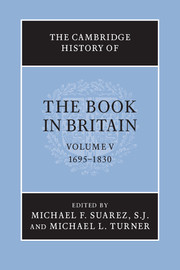Book contents
- Frontmatter
- Introduction
- PART I THE QUANTITY AND NATURE OF PRINTED MATTER
- PART II ECONOMIC, LEGAL AND CULTURAL CONTEXTS
- PART III THE TECHNOLOGIES AND AESTHETICS OF BOOK PRODUCTION
- PART IV THE BOOK TRADE AND ITS MARKETS
- I LONDON AND THE ‘COUNTRY’
- 13 London and the central sites of the English book trade
- 14 Personnel within the London book trades: evidence from the Stationers’ Company
- 15 The English provincial book trade: evidence from the British book trade index
- 16 The Scottish book trade
- 17 The Irish trade
- II TWO CASE STUDIES
- III SERIAL PUBLICATION AND THE TRADE
- IV THE INTERNATIONAL MARKET
- V BOOKS AND THEIR READERS
- Abbreviations used in bibliography
- Bibliography
- Index
- Frontispiece
- Plate section
17 - The Irish trade
from I - LONDON AND THE ‘COUNTRY’
Published online by Cambridge University Press: 28 September 2010
- Frontmatter
- Introduction
- PART I THE QUANTITY AND NATURE OF PRINTED MATTER
- PART II ECONOMIC, LEGAL AND CULTURAL CONTEXTS
- PART III THE TECHNOLOGIES AND AESTHETICS OF BOOK PRODUCTION
- PART IV THE BOOK TRADE AND ITS MARKETS
- I LONDON AND THE ‘COUNTRY’
- 13 London and the central sites of the English book trade
- 14 Personnel within the London book trades: evidence from the Stationers’ Company
- 15 The English provincial book trade: evidence from the British book trade index
- 16 The Scottish book trade
- 17 The Irish trade
- II TWO CASE STUDIES
- III SERIAL PUBLICATION AND THE TRADE
- IV THE INTERNATIONAL MARKET
- V BOOKS AND THEIR READERS
- Abbreviations used in bibliography
- Bibliography
- Index
- Frontispiece
- Plate section
Summary
The late start of printing in Ireland, in 1551, is an indication of the relative isolation and backwardness of its economy. Printing was introduced to the country as an instrument of government policy to promote its secular aim of securing power and religious objective of promoting the reformed religion. The complete dominance of English rule did not occur until the early seventeenth century, however, and the reformed religion of the state church never received acceptance from the majority of the population. The development of printing was slow. With the exception of a few items printed in Kilkenny and Waterford during the 1640s and 1650s and a modest trickle of works printed in Cork from 1644 on, printing was confined to Dublin. Moreover, before 1680 there was never more than one printer in business in Dublin at any one time.
The potential growth of the book trade was hampered by the highly exclusive nature of the powers granted in the patents of the successive King’s Printers. The terms of the last of the patents granted to John Frankton in 1609 were extremely wide-ranging, giving him complete authority over the printing, binding and bookselling of everything and forbidding others to engage in any aspect of the trade without his licence. Significant penalties were laid down for any infringement. The successive patents issued in the seventeenth century followed the same terms. The last of these, granted on 26 June 1693, was in force until 1727. It was not until the second of George Grierson’s patents was enrolled on 18 June 1730 that printers in Ireland became at last entitled to print everything except the Bible, service books and state publications. Enforcement was another matter, however, and in practical terms the trade in Dublin had liberated itself from the oppressive terms of the patents by the early 1680s.
- Type
- Chapter
- Information
- The Cambridge History of the Book in Britain , pp. 366 - 382Publisher: Cambridge University PressPrint publication year: 2009
- 2
- Cited by

